Click here and press the right key for the next slide.
(This may not work on mobile or ipad. You can try using chrome or firefox, but even that may fail. Sorry.)
also ...
Press the left key to go backwards (or swipe right)
Press n to toggle whether notes are shown (or add '?notes' to the url before the #)
Press m or double tap to slide thumbnails (menu)
Press ? at any time to show the keyboard shortcuts
Sharing a Smile
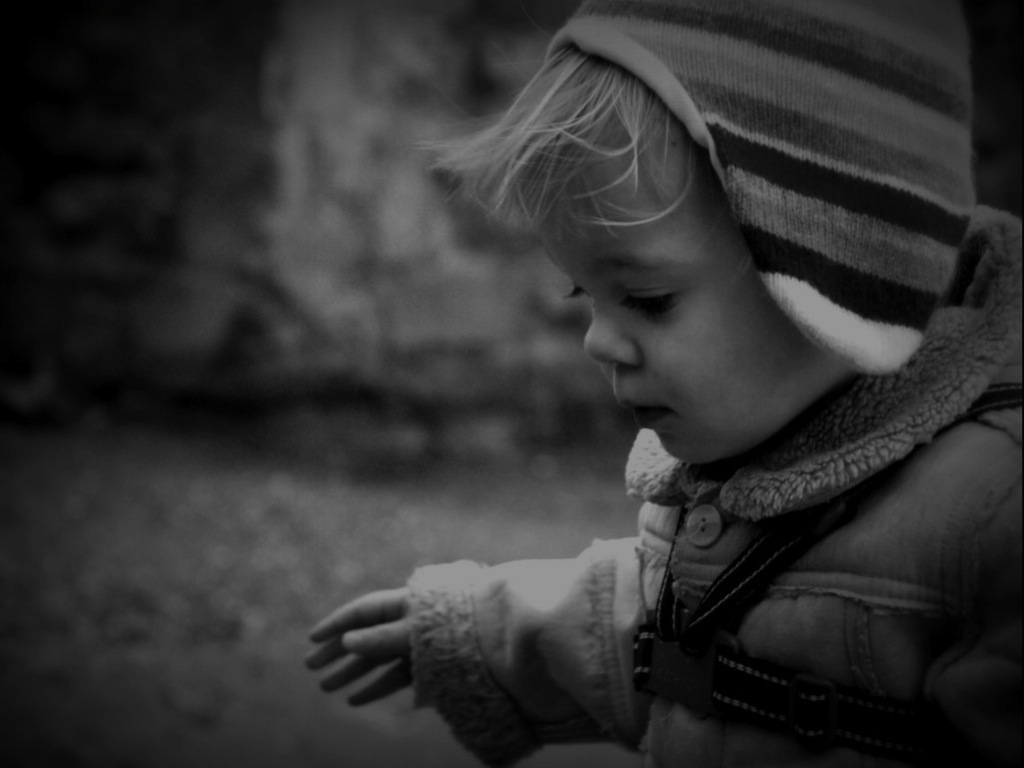
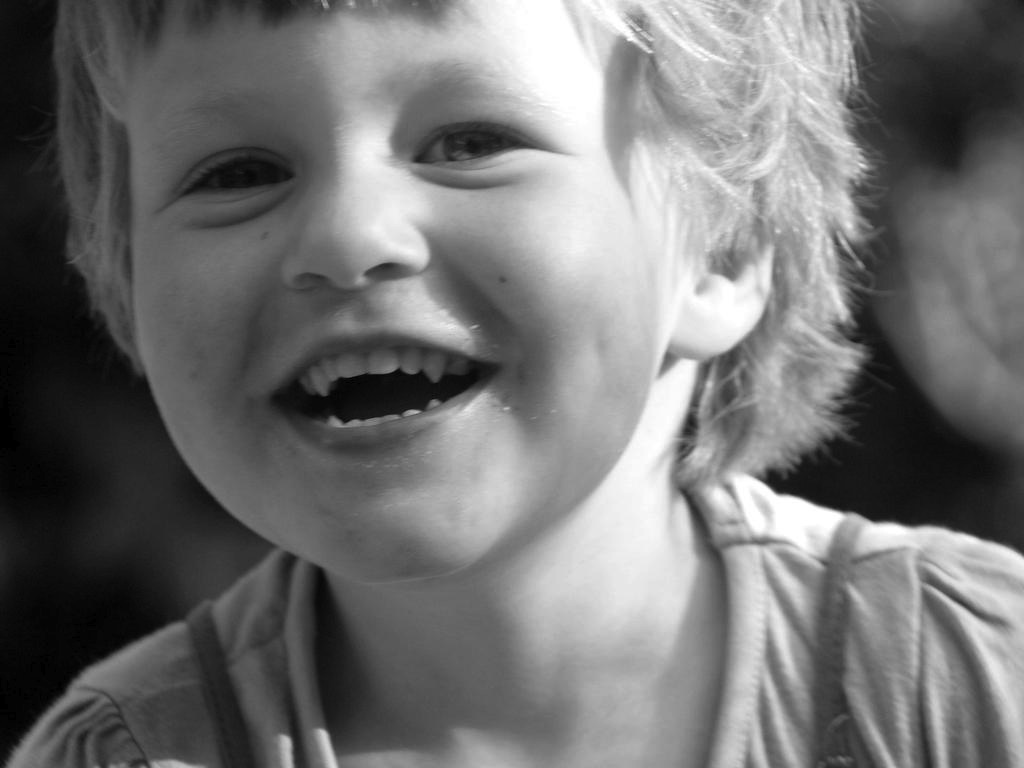
[THIRD POINT: smiling is a instrumental action, the goal of which is to smile that smile]
My topic is sharing a smile. But first think about ordinary, individual actions like genuine smiles.
What distinguishes a genuine smile from a muscle spasm or the exhalation of wind?
I want to suggest that it's this: the smile is a instrumental action where the goal is to simile that smile.
But why think of the smile as instrumental? Because smiling the smile requires considerable motor coordination: it’s not a matter of simple muscle contractions but more like the production of a phonetic gesture where context affects what is needed to realise the smile.
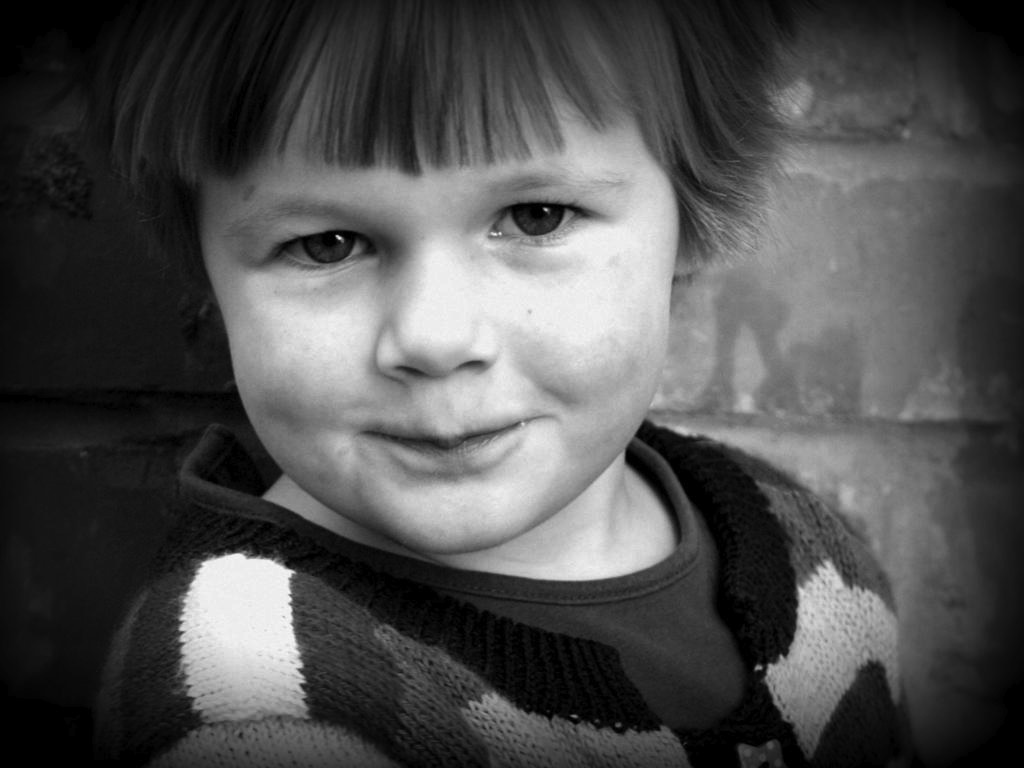
Further, like grasping an object or articulating a particular phoneme, it is an action that can be realised by different bodily movements in different contexts.
This is why I put slides of two quite different but both genuine smiles.
[Objection:]
Now you might say that the smile can't be instrumental because is isn't explicable by appeal to belief, desire and intention
This is because the genuine smile is spontaneous and not something that can be produced at will (although it could probably be inhibited, at least to some extent); after all, this is what distinguishes the genuine from the polite smile.
\footnote{
From web source: The Duchenne smile involves both voluntary and involuntary contraction from two muscles: the zygomatic major (raising the corners of the mouth) and the orbicularis oculi (raising the cheeks and producing crow's feet around the eyes). The zygomatic major can be voluntarily contracted but many people can't voluntarily contract the orbicularis oculi muscle.
}
So now we might be tempted by the view that a smile is merely caused by an emotion in the way that gasses can cause you to burp.
[Reply:]
Maybe there are smiles like this, but some genuine smiles are sustained.
And what sustains them is a process of controll
How could this be if such smiles are not consequences of beliefs, desires and intentions?
I think a reasonably natural view here is to think that part of what makes an event a smile, a instrumental action and not just a muscle spasm caused by excess wind, is the way that motor control is involved. Specifically, the genuine smile will involve a motor representation of the outcome, the smile, and this motor representation will lead to movements by way of planning-like motor processes.
But you don't have to buy this to agree with me.
All you have to accept is that actions like some smilings can be instrumental and controlled even in the absence of relevant beliefs, desires and intentions.
I think smiles fall into the category of actions like graspings, reachings and gesturings which are instrumental but do not necessarily involve intention.
So far, then, I've suggested that smiling is a instrumental action, the goal of which is to smile that smile.
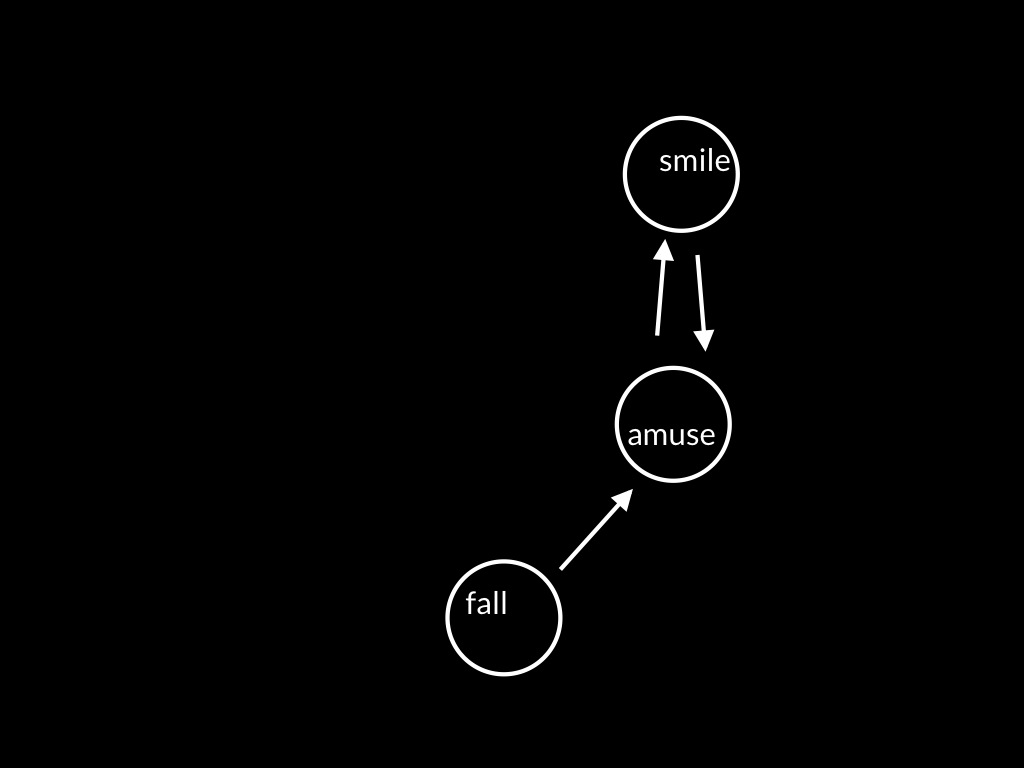
Now imagine a situation where a single individual encounters and event (a clown’s falling) which causes amusement which causes her to smile
Note that the smile also modulates the emotion; if, for example, she supressed the smile, the quality of her amusement would change.
How could we gain insight into the fine-grained dynamics of others’ emotions?
How could we ever appreciate the unfolding of another’s grief, or the way their engagement leads to an explosion of ecstasy at the climax of a concert?
Part of the answer is obvious: by being there, with them.
[Not that this is the only possibility --- in some cases we might be told.]
But how exactly does being there, in the same situation help?
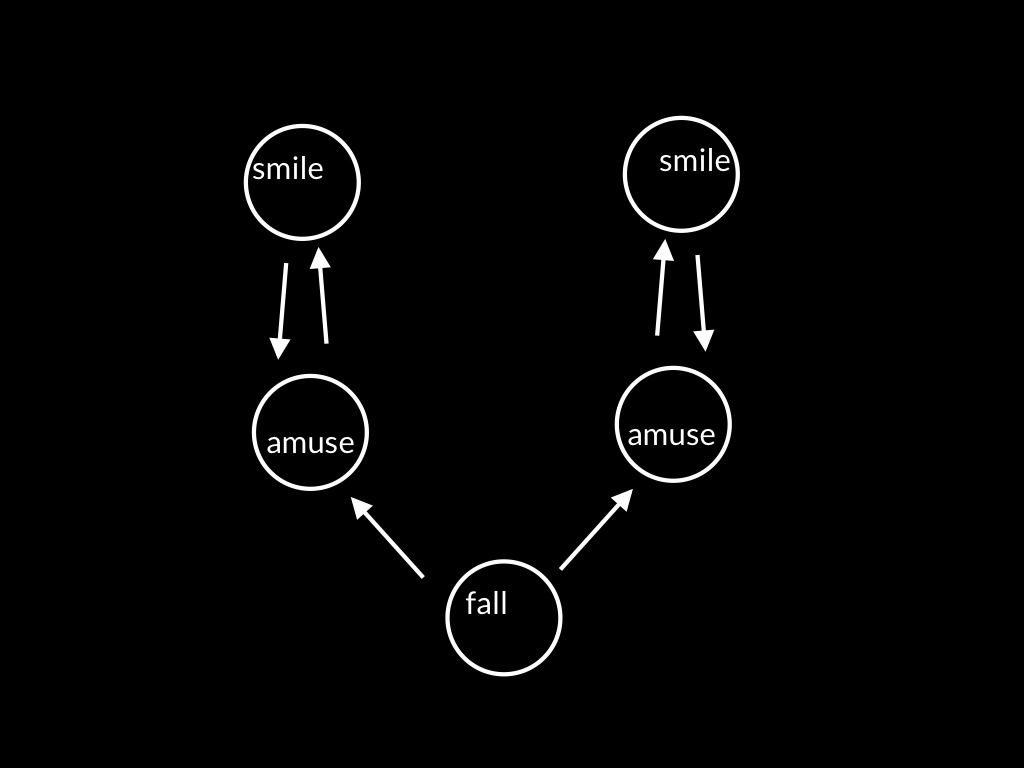
Merely being in the same situation is surely not enough.
It’s not enough that we each experience amusement, grief or ecstasy.
After all, individuals are different. Different individuals’ feelings don’t unfold in the same way just because they are in the same situation.
It’s just here that collective intentionality is relevant.
**What is involved in sharing a smile?**
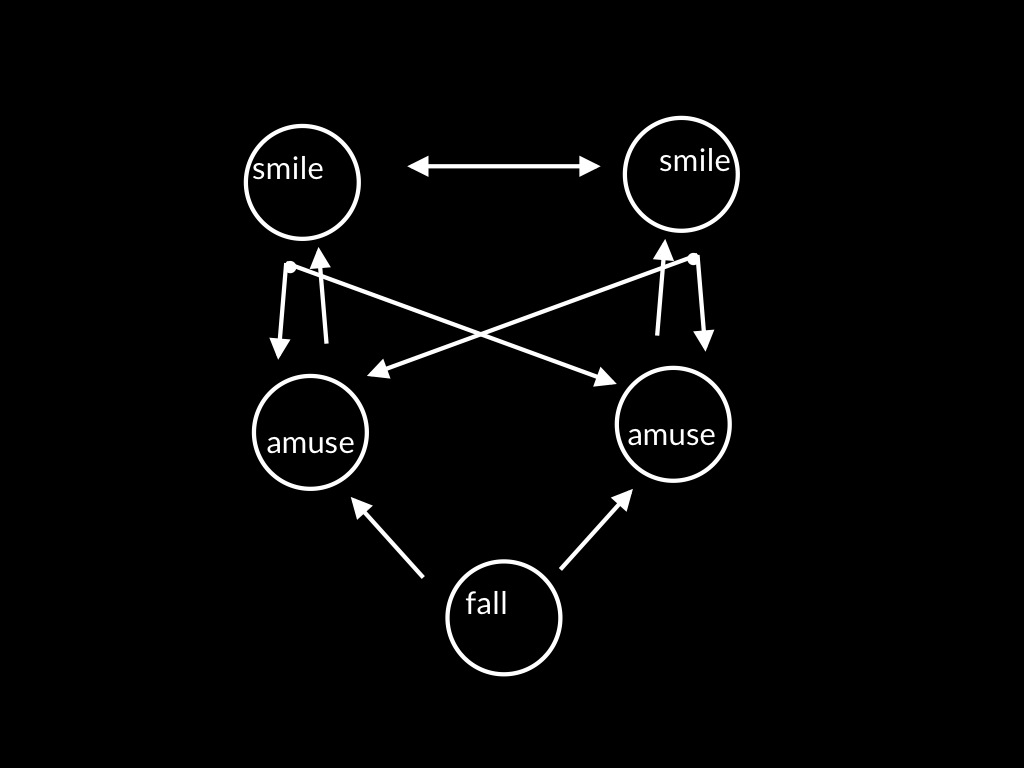
Minimally, I think there have to be two kinds of connection between us for us to share a smile.
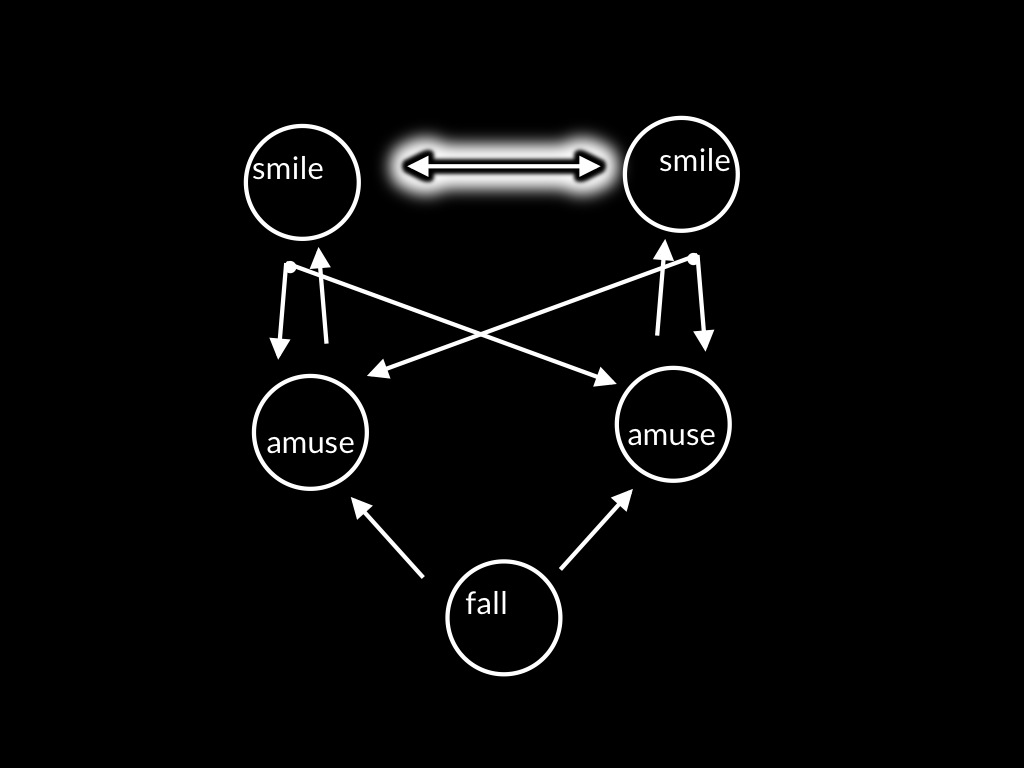
First, the way your smile unfolds is shaped by how mine unfolds and conversely.
I also suppose that our smiles can be minutely coordinated with each other.
But it’s not just that our smiles are interdependent in this way ...
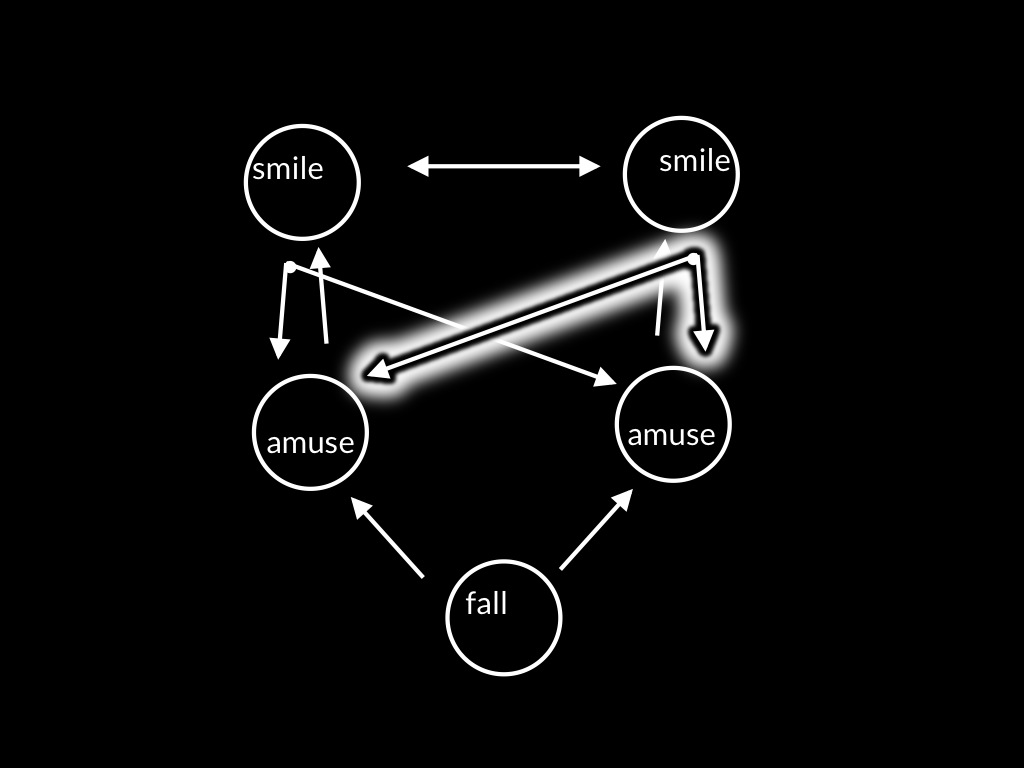
It’s also that each of our smiles is shaping the way our amusement unfolds.
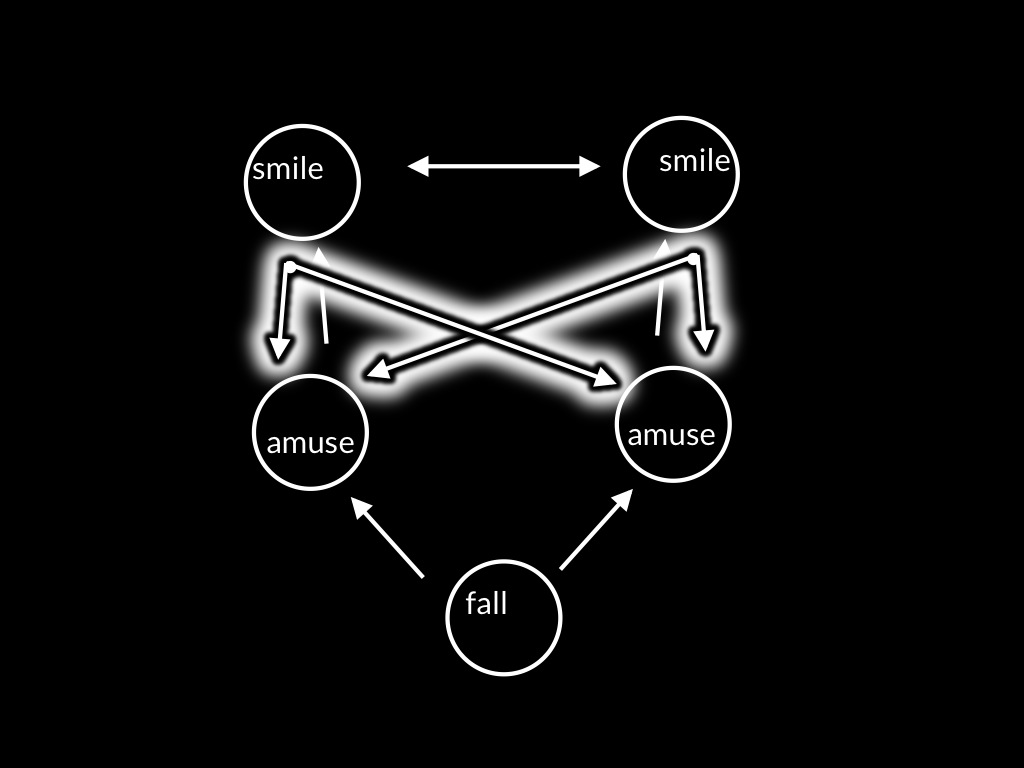
So the way your amusement unfolds is being controlled by, and controlling, the way mine unfolds.
In sharing a smile, we are emotionally locked together.

[*todo: remove motor stuff for this talk! Also: don't lose sight of idea that control is a way of knowing.]
[*todo: need slide with control arrows highlighted (my emotion controls yours).]
[*Structure:
(i) I know because my emotion controls yours;
(ii) But if my emotion controls yours, how can yours be amusement at the clown's falling? because control is partial, and reciprocal;
(iii) But the mere fact of control isn't enough for knowledge; rather, control must show up in experience somehow.
After all, for all I have said so far, we might, in sharing a smile, be unaware that our emotions are locked together.
(iv) There must be an experience that is distinctive of sharing a smile.
(iv) Note that I don’t want to say that someone who is sharing a smile needs to understand the situation in the way I’m describing it.
All I'm claiming is that the fact of reciprocal control somehow affects our awareness.
(v) It may affect in our awareness insofar as we are sensitive to contingencies between our own actions' and others' actions,
and between our actions and the causes of them.
(vi) So my position is this: the reciprocal control justifies each agent in making judgements about how the others' amusement is unfolding,
and this justification is at least indirectly available to the agents by virtue of their having experiences characteristic of sharing a smile.
]
Our being emotionally locked together means that
to a significant extent I am feeling what you are feeling,
that the way my amusement is unfolding matches they way your amusement is unfolding.
So if you know how your own amusement is unfolding and you know that we are emotionally locked together,
you can know much about how my amusement is unfolding.
So joint expressions of emotion like sharing a smile have the potential to enable us to know not just that others are amused but how their amusement is unfolding.
But the fact of reciprocal control (which means our emotions are locked together) together doesn’t all by itself mean that we can know how each other’s emotions are unfolding.
After all, for all I have said so far, we might, in sharing a smile, be unaware that our emotions are locked together.
Now you might think this sounds implausible because its hard to imagine sharing a smile without an experience that is distinctive of sharing a smile.
And it might be natural to describe this experience as an experience of sharing.
But even if that is correct, it’s necessary to say exactly why someone who is sharing a smile is in a position to know things about how the other’s emotion is unfolding.
I don’t want to say that interaction only helps if you know that your emotions are locked together.
That is, I don’t want to say that someone who is sharing a smile needs to understand the situation in the way I’m describing it.
But minimally the fact of reciprocal control must somehow feature in our awareness.
[*The idea in outline:
1. the ways our amusements unfold is locked together
1. this is in part because a single motor plan has two functions, production of your smile and prediction of my smile
1. the single motor process means that we might experience being locked together in some way (not that our emotions are locked together but that our actions are, in something like (but not exactly) we experience actions when seeing ourselves in a mirror or on CCTV (check Johannes’ discussion of this)).
]
Here I want to offer a wild conjecture.
In joint expressions of emotion there is a single motor plan with two functions,
production and prediction.
The motor plan both produces your own smile and enables you to predict the way the other’s smile will unfold.
[*missing step about monitoring and experience. (The Haggard idea: motor planning can give rise to experiences concerning one's own actions (Haggard, 2005).)]
Because your plan has this dual function, your experience of the other’s (my?) smile is special.
From your point of view, it is almost as if the other is smiling your smile.%
\footnote{
Joel caricatured this idea seeing me eating fruit: ‘it’s almost as if I’m eating that fruit.’
}
This means that sharing a smile has characteristic phenomenology.
This odd phenomenological effect means that in sharing a smile we can each think of the situation almost as if there were a single smile.
And almost as if there were a single state of amusement.
(In thinking of the situation like this it is important that we have a subject-neutral conception of the amusement and an agent-neutral conception of the smile.%
\footnote{
Tom Smith asked about this. I clarified that I wasn’t suggesting there was a state of amusement which is ours, nor that the subjects are thinking of the situation in this way.
That’s the point of the appeal to subject-neutral amusement.
It’s a partial model of the situation.
}
[*Here I think I’m shifting back from the perspective of the participants in sharing a smile to the perspective of the theorist.
Probably what I should say is, first, that a theorist can think of the situation in this way and use this to argue, second, that there is a simple, partial conception of the situation that doesn’t require understanding reciprocal control and interlocking emotions but is sufficient for each smiler to have knowledge of the way the other’s emotion unfolds.]
So my suggestion is that in sharing a smile you experience my smile almost as if it were yours (or: you experience me almost as if I were smiling your smile),
and so you might also experience our situation almost as if it involved a single state of amusement.
It's more like we each plan a single smile.
But---to reply to the objection---these plans have a dual function.
Your plan both produces your own smile and enables you to simulate---to experience---my smile.
And likewise for my plan.
The interdependence of our smilings means that we could each think of the situation as if it were one in which a single state of amusement were responsible for our actions.